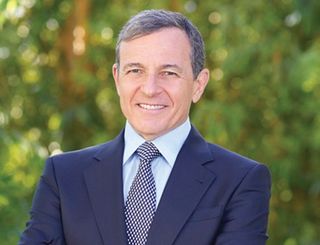Disney Earnings Up But Below Estimates

The Walt Disney Co. reported higher second-quarter earnings as success at the movie box office overcame lower ad revenues at ESPN and A&E.
Net income rose 2% to $2.14 billion, or $1.30 a share, in the quarter from $2.1 billion, or $1.23 a share, a year ago.
Revenues rose 4% to $12.5 billion.
Disney shares fell because the figures were lower than Wall Street estimates
“We’re very pleased with our overall results in Q2, which marks our 11th consecutive quarter of double-digit growth in adjusted EPS,” CEO Bob Iger said in a statement. “Our Studio’s unprecedented winning streak at the box office underscores the incredible appeal of our branded content, which we continue to leverage across the entire company to drive significant value. Looking forward, we are thrilled with the Studio’s slate and tremendously excited about the June 16th grand opening of the spectacular Shanghai Disney Resort.”
Operating income at Disney’s media networks unit was up 9% to $2.3 billion. Revenues were flat at $5.8 billion.
Cable networks operating income was up 12% to $2.02 billion, even though revenue for the quarter decreased 2% to $4 billion.
Broadcasting & Cable Newsletter
The smarter way to stay on top of broadcasting and cable industry. Sign up below
ESPN’s operating income was up because of lower programming costs and higher affiliate revenues, partially offset by a decrease in advertising revenue. The programming costs and advertising revenue were affected by a shift in college football playoff games moving from the second quarter last year to the first quarter this year. Ad revenue was also affected by lower ratings and rates, the company said.
On the company’s earnings call, CFO Christine McCarthy said that ESPN’s ad revenue was down 13%, but adjusting for the timing of the college football games, ad sales would have been up 3%.So far during the current quarter ESPN’s ad sales are pacing 5% ahead of last year, she said.
Affiliate revenue was up despite a decline in subscribers.
Cable networks also got lower equity income from A+E Networks because of a decrease in advertising revenue, higher programming costs and a negative impact from the conversion of the H2 channel to Viceland.
Broadcast operating income was down 8% to $278 million as revenue rose 3% to $1.8 billion. The broadcast group had lower income from program sales and higher programming and marketing costs. Programming costs increased because the average cost of new scripted programming was higher that previously.
Advertising and affiliate revenue were up. In scatter, ABC’s ad pricing is up 20% above upfront levels, McCarthy said.
Studio Entertainment operating income was up 27% on the strength of Star Wars: The Force Awakens and Zootopia.
Theme parks showed a 10% increase in operating income.
A+E Networks, inwhich Disney owns a 50% stake, registered a $332 million gain in connection with the acquisition of an interest in Vice Group Holding.
During the earnings call Iger was asked about the sudden departure of his heir apparent, Tom Staggs, who apparently didn’t have the full confidence of the board and has left the company.
Iger called “a valued colleague” and said he was sorry about what happened. But he said the board was working on succession and believed it could find a candidate and get him up to speed before Iger is schedule to retire.
“I don’t currently have any plans” to extend his contract beyond June 2018, Iger said.
Iger was also asked about Hulu, which last week announced plans to introduce a new service that would offer live streaming TV in addition to SVOD.
“Hulu’s become an important investment for us,” he said, as both a distributor of Disney programming, but also as a buyer of original content. He offered few details about what the new Hulu service would be like, other that to say it would be a “best of cable approach.”
He added that Disney and 21st Century Fox, which also owns a stake in Hulu are “fully aligned” in terms of Hulu’s strategy. And he volunteered that with many of Disney’s current distributors in the content creation business—namely Comcast, which also owns a stake in Hulu—he didn’t think getting into the distribution business with Hulu would have a “negative impact” with traditional distributors.
Iger declined to comment on reports Disney is interested in buying Major League Baseball’s BAM digital media unit. But he said he was “very impressed with the product,” which is “probably among the best out there.”
He said he was confident in ABC’s leadership under Ben Sherwood and new entertainment division president Channing Dungey. He watched ABC’s pilots while in China, where Disney has opened its new theme park. “I like what I see,” she said of the new shows.
Jon has been business editor of Broadcasting+Cable since 2010. He focuses on revenue-generating activities, including advertising and distribution, as well as executive intrigue and merger and acquisition activity. Just about any story is fair game, if a dollar sign can make its way into the article. Before B+C, Jon covered the industry for TVWeek, Cable World, Electronic Media, Advertising Age and The New York Post. A native New Yorker, Jon is hiding in plain sight in the suburbs of Chicago.

